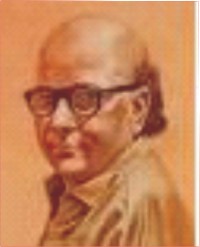Feature
Syed Mujtaba Ali- the man with
a head and two good feet!
Muhammad Eusha
 Does the title surprise my readers? Indeed, how does having a head and two good feet make a man different from others? Well, it is the genius of his head that makes him stand out in a million and the feet, of course, make him one of the greatest travelers our country ever has produced. We are talking about Syed Mujtaba Ali, one of the few names the Bangladeshis can truly be proud of; about whom Rabindranath Tagore used to say with a smile on his face- 'my Mujtaba knows Bengali'. Does the title surprise my readers? Indeed, how does having a head and two good feet make a man different from others? Well, it is the genius of his head that makes him stand out in a million and the feet, of course, make him one of the greatest travelers our country ever has produced. We are talking about Syed Mujtaba Ali, one of the few names the Bangladeshis can truly be proud of; about whom Rabindranath Tagore used to say with a smile on his face- 'my Mujtaba knows Bengali'.
The focus of this essay really is not an autobiographical analysis of Mujtaba's life. I rather want to throw some light on the relation of his literature with his life- something which is equally interesting. His life has had a great influence on his habit of writing; in fact, they are so interlinked that it will not be an exaggeration to state that his literary genius has been a fruit of his interaction with the people that he has been with and the places he has been to. The time during which he lived has had another important role in colouring his literary activities the way they are. This is more or less true about every other literary figure- anyone is obviously influenced by those three factors; but some insight and inspection will lead us to the fact that it is truer in the case of Mujtaba Ali.
Mujtaba was born in the early part of the twentieth century in India. The atmosphere of his home was congenial for the sound growth of a person as a thinker. This can be justified by remembering that he had two brothers and five sisters who were all meritorious students and received scholarship in primary school. However, they could not pursue higher education due to prevailing social restrictions. The three brothers also made themselves worthy of remembrance indeed. Mujtaba's elder brother Syed Mustafa Ali, a civil servant and a literary figure, graduated with honors in English literature from Dhaka University. Syed Murtaja Ali, the one in the middle, also was a civil servant along with contributions to literature. Altogether, the Ali family was an educated and qualified one.
Urdu is, most probably, the first language he learned after his mother tongue. Even hundred years back, it was an established trend of the time that Urdu and Arabic will be practiced in the higher class Muslim families (surprisingly, some Hindu families as well) and the Ali family was no different. Urdu, easily being the strongest language of the subcontinent, increased his potential to express himself which has been reflected in many of his literary pieces. He had the opportunity to go through the prominent Urdu writers of his time- which included names as high as Iqbal. His early childhood education was followed by his going to Shantiniketan. He came in touch with the master poet and writer Tagore, someone who freshly won the Nobel Prize back then (1913). It can be argued that Mujtaba was not really 'influenced' by Tagore but was impressed by him. Mujtaba had an astonishingly personal style of expression which is absolutely his own and it is very hard to find similarity between him and any other contemporary figures in literature- home or abroad. To be truthful, his style is still unmatched, long after his death in 1974. In numerous essays, Mujtaba has praised Tagore but never looked quite attracted enough to be influenced by him. But the humbleness of an ever-learning student never ever let Mujtaba feel the bites of pride! Tagore himself used to praise the command Mujtaba had in Bengali. The latter was exceptionally capable in his mother-tongue and his knowledge was stretched enough to cover the technical issues (grammar) of the language as well.
The languages he learned in Biswabharati included Sanskrit, English, French, German, Persian, Arabic, Italian, Hindi, and Gujrati. He studied in Kolkata University as a private student. He gathered immense knowledge about people during his young years in Kolkata of undivided India. Many of his writings reflect the memories of the great city. Following a brief period in Aligarh University, he left for Europe (Germany) with a scholarship. Europe was a different experience for Mujtaba. He arrived in Germany with quite a sound knowledge in German language. He studied at Bonn University and even had the experience of seeing a hasty Einstein rushing through the university corridors saying 'pardon, pardon!'
The teachers of his time were all great names in the field of philosophy. However, his stay in Germany in the late twenties and early thirties gave him an opportunity to come in touch with European lifestyle. He had to hide from the police at night with other university students (who were mostly drunk) guilty of throwing stones at windows, had corrected mistakes of a German professor of Bengali language in Bonn and was mistaken by a gypsy girl to be one of her own kind!
Mujtaba's education followed in Al-Azhar University, Egypt. This was, again, a joyride for Mujtaba. His stay in the Egyptian environment produced a large number of essays mixed with humour and perspective on life of the Arabs in Egypt. He portrayed the city of Cairo beautifully with his personal experiences and encounters with the local Arabs.
Before his entrance to Cairo, Mujtaba served as a professor of French and English in the Agricultural College of Kabul. This was indeed a marvelous opportunity for him to learn about life in Central Asia. His memories of Kabul inspired him to write 'Shabnam' a tale of love, written in first person, his love story with an admirably beautiful woman named Shabnam. The Muslim culture and a very soft love story are portrayed together in this fantastic piece of literature where he has proved his excellent command over Bengali along with French, English and Arabic.
He went back to Europe on the eve of the Second World War. This time it was more for the purpose of traveling. His traveling experiences ranged from Paris to remote sides of Europe. Many of his essays illustrate his unforgettable experiences while being in the continent of the white men. They are sometimes touchy, sometimes funny and sometimes simply observant. The tale of a German doctor, his experience of looking for a Jewish mother in a hostile situation in Germany, meeting a very handsome man in Paris, getting introduced to an addict meritorious Bangladeshi artist, being envied by a little girl for having black hair in Switzerland - his experiences are countless in number and colors.
Mujtaba died in 1974. And thus we lost one of the greatest literary careers of all time in Bengali literature.
(3rd year BUET student)

|
